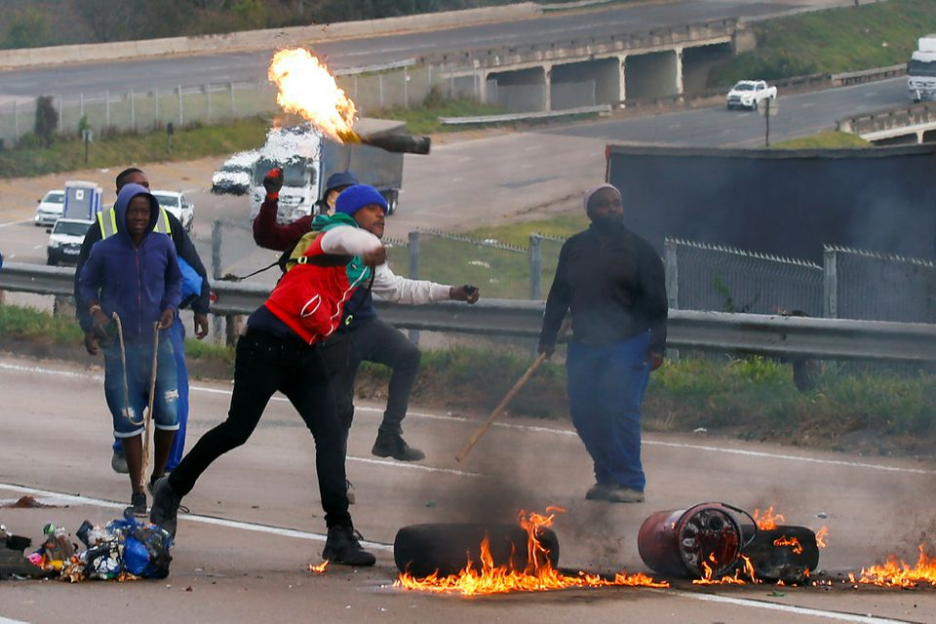PRESIDENT Cyril Ramaphosa has condemned the ongoing violence that has been ravaging the country’s main economic provinces – Gauteng and KwaZulu-Natal, for the past few days following the imprisonment of former President Jacob Zuma.
Ramaphosa said it was a matter of concern to all South Africans that some of these acts of violence were based on ethnic mobilisation.
Protesters in KwaZulu-Natal and Gauteng have been burning vehicles, looting stores and blockading main routes in protests against Zuma’s jail sentence of 15 months that the Constitutional Court imposed on him for contempt of court after he refused to return to the Commission of Inquiry into State Capture.
“While there are those who may be hurt and angry at this moment, there can never be any justification for such violent, destructive and disruptive actions,” said Ramaphosa during a televised address on Sunday.
“This must be condemned by all South Africans at all costs as we are a nation committed to non-racialism and non-tribalism that is underpinned by the diversity and unity of all the people of South Africa, whatever their language, culture, religious beliefs and race.”
Ramaphosa said since the advent of democracy, institutions like the Constitutional Court have been at the forefront of improving the lives of South Africans.
“Our commitment to our democratic Constitution is based on the fundamental principle that all people are equal before the law, and that all people have the right to equal protection before the law. The rule of law safeguards against the abuse of power. The rule of law protects the poor and the vulnerable,” said Ramaphosa.
“Let us be clear, as a nation, that we will not tolerate acts of criminality. Those who are involved in acts of violence will be arrested and prosecuted. Those found guilty of breaking the lockdown regulations will receive the stipulated penalty. This will be done without fear or favour.”
The protests began last week as Zuma’s supporters called for his release after the ex-president turned himself in to authorities on July 7.
Zuma was sentenced to 15 months in jail for defying a court order to testify at a graft inquiry.
He denies any wrongdoing and is challenging the sentence, with a court hearing set for Monday.
The outbreak of violence is a response to an “unjust” system, Jacob Zuma Foundation spokesman Mzwanele Manyi told eNCA in an interview on Saturday.
“It is the result of a vicious sentence given to a 79-year-old man without giving him the right to a fair trial.”
In KwaZulu-Natal, protesters set fire to large trucks and vehicles while shops were looted and burnt overnight in Johannesburg as marched through the city.
Major highways in and around Johannesburg were closed as random shots were fired at passing motorists.
M2 closed off to traffic in both directions between Cleveland following continuous riots in the area with reports of shots being fired at passing vehicles.
Traffic was diverted at Maritzburg St and Cleveland Rd.
SABC news reporter Natasha Phiri and video journalists Gqabi Njokweni were robbed of their equipment while covering the protests in Alexandra.
Newzroom Afrika reporters and their vehicle were also attacked by protesters in Johannesburg.
Johannesburg Metropolitan Police Department (JMPD) said there had been looting in the Alexandra township and Jeppestown suburb in Johannesburg.
KwaZulu-Natal police spokesman Jay Naicker said there had also been more looting in eThekwini, the municipality that includes the coastal city of Durban.
“We saw a lot of criminals or opportunistic individuals trying to enrich themselves during this period,” he said.
National intelligence body NatJOINTS warned that those inciting violence could face criminal charges.
NatJOINTS said in a statement that 62 people had been arrested in KZN and Gauteng, the country’s main economic hub where Johannesburg is located, since the violence began.
- Inside Politics

